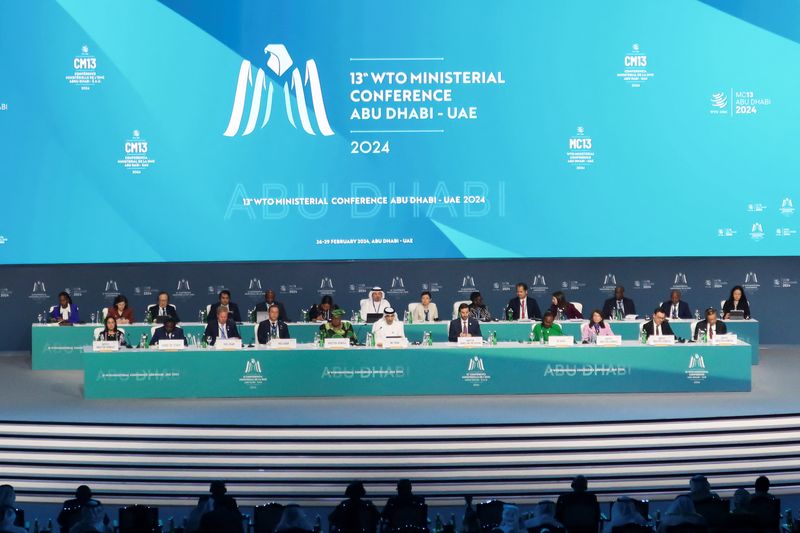By David Lawder
WASHINGTON (Reuters) - The World Trade Organization's moratorium on customs duties on digital transmissions, a key pillar of internet development for decades, won a last-minute reprieve on Friday, but the deal will force companies to confront its expiration again in 2026.
The WTO's 13th ministerial meeting in its final hour produced a deal in Abu Dhabi to extend the moratorium until the until the next ministerial meeting in two years, but with a hard expiration that will require a more extensive negotiation at that time.
"Some countries may take it as an opportunity to get to work in building tariff systems to go live in 2026," a source close to the talks told Reuters, speaking on condition of anonymity.
India, which had sought concessions on agriculture, had blocked the extension but reversed course after a request from host United Arab Emirates, leaving the two-year extension as the only significant outcome from the meeting.
Few trade experts know what digital tariffs would look like in practice, as the moratorium was launched in 1998 to foster growth in the fledgling internet and has been regularly renewed since then. Now, with massive companies such as Google (NASDAQ:GOOGL) and Microsoft (NASDAQ:MSFT) taking in hundreds of billions of dollars in revenues, more countries want a share of those riches and tariffs offer a potential avenue.
But such duties would "make it harder for companies that rely on data and digital services - which is effectively all companies in this day and age," said Naomi Wilson, who heads trade policy at the Information Technology Industry Council, an industry group in Washington.
"So it's more than a Big Tech problem or a developed country problem," Wilson said. "It really stands to undermine the entirety of the digital economy."
INDONESIA TEMPLATE
Thus far, only Indonesia has a regulation in place that would allow the imposition of duties on digital goods, which it describes as software, electronic data and multimedia transmissions delivered via electronic transmissions.
Currently, Indonesia's tariffs on such transmissions are zero, in line with the moratorium. But Indonesia said in a WTO statement that as more imports have shifted to digital delivery, such as movies, video games and music, low-income and developing countries lost $56 billion of tariff revenues between 2017 and 2020. Indonesia added that digital duties would help local software developers and content providers better compete with global technology giants.
U.S. industry groups also called for the ban on digital tariffs to be made permanent to end perpetual threats by some countries to block renewal to try to win concessions elsewhere.
"It's a relief to see the moratorium survive, by the skin of its teeth," said Tiffany Smith, vice president of global trade policy at the National Foreign Trade Council, a group representing large U.S. companies.
"The endless brinkmanship over the moratorium crowds out the ability to make progress on a broader agenda if important issues and undermines the viability of the WTO as a useful forum for trade ministers," Smith added.

Should the moratorium ultimately be scuttled, a likely outcome is that some 140 countries supporting it would agree to renew it as part of a WTO "joint statement initiative," representing most major economies, said William Reinsch, a trade expert at the Center for Strategic and International Studies think tank in Washington.
"That would provide some modicum of reassurance to the business community," Reinsch added.